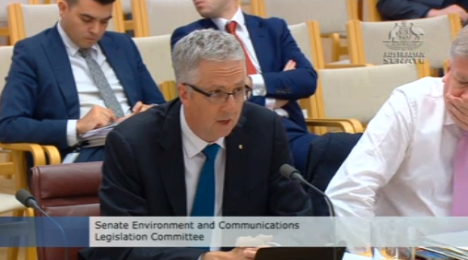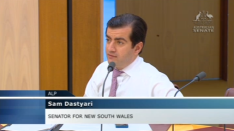ABC boss denies ‘gagging’ former tech editor Nick Ross over his NBN coverage
Outgoing managing director of the ABC, Mark Scott, has defended the public broadcaster’s handling of its NBN coverage in the wake of accusations from former technology editor, Nick Ross.

Scott: the ABC did not seek to gag Nick Ross.
In his final appearance at the Senate Estimates committee Scott faced questions about claims made by Ross, who claimed he had been “gagged” on the the NBN during his six year stint with the public broadcaster, after he left the last month.
“I want to make it clear that at no time has the ABC sought to shape editorial coverage in any attempt to gain favour with politicians or political parties,” Scott told the Estimates inquiry.
“Nor did it seek to gag Mr Ross. What we wanted to do was to ensure he acted in line with the editorial policies that existed at the ABC. That is our responsibility as editorial managers, that is our requirement under the ABC Act.”
Scott accused Ross of publishing an 11,000 word “treatise” without referring it to senior editorial managers, and claims he had a “closed view” on the issue of the NBN.
“[An ABC journalist] is a very different role to a technology blogger”, said Scott.
“I cannot recall a time when we have published anything at 11,000 words – a factor of many times longer than anything else we have published. Unprecedented in its scale.
“Given the nature of the piece and the fact it was not upwardly referred, that it was not discussed with any of his line managers – that is most unusual; it was not in keeping with the usual practices.”

Dastyari questioned why the ABC had not launched an inquiry into the matter.
Ross has subsequently disputed Scott’s statements, tweeting: “Ha! Saying I’m not balanced in my #NBN article. First time an ABC manager has told me that”.
“I have never been told I broke Ed Pols (editorial policies). It’s as simple as that. That’s (cause) I haven’t. Even Media Watch couldn’t spin that.”
Scott defended the use of the word “insurance” by Belsham in the recordings, saying: “As I read it I understood exactly what Belsham was saying. I think he was saying that the coverage was not complete or comprehensive but I’m not sure Mr Ross shared that view.”
The ABC boss rejected suggestions that the matter had hurt public confidence and that it needed an inquiry, but noted the ABC board had the right to request an inquiry if it wished.
Mark Scott was also questioned about the differences between the ABC and fellow public broadcaster SBS, and why taxpayers funded two separate organisations. Scott raised the prospect of a merger between the two in the longer term saying it was “worthy of investigation down the track.”
However, he also noted it was a “matter for government”, Scott said: “SBS was created well before digitisation and well before digital television … it’s an analogue solution in a digital world.
“I suspect that the SBS of today, which is more general interest broadcasting, means the distinction between the two broadcasters is not as (strong) as it once was,” he said.
“For example, I think it’s true to say on any reckoning that there is far less subtitled content on its main channel than 20 or 30 years ago.”
Scott finishes in the role of managing director in April when he will be replaced by Google executive Michelle Guthrie.
Nic Christensen
Update 5pm – A spokeswoman for SBS has responded to Scott’s remarks with the following statement:
“SBS’s sole focus is on continuing to provide unique services to multicultural Australia at a time when inspiring a greater understanding of the value of multiculturalism has never been more important,” said the spokeswoman.
“Our audiences are up 11 per cent and we are using digital technology in a way that no other broadcaster can to reach multicultural communities, with more multilingual content that at any time in our history across all platforms – TV, radio, online and via digital services.”




Scott created the problem when he promoted opinion in the ABC reporters’ work on the web. He has no leg to stand on so he carries on about the number of words as if that is any criteria in a medium of unlimited inventory.
Scotts real problem with SBS is that they do a better job. If it was a choice I’d shift budget to SBS.
User ID not verified.
The last few years there has been a steady decline in the quality of ABC News. It’s not just the NBN that was gagged, the TPP has had minimal coverage, with nothing in the lead up to the signing last week.
It’s hard to not think this is a top down push to turn the ABC in to a government propaganda mouth piece.
User ID not verified.
ABC News 24 senior editors should take a serious look at a deteriorating News24 which seems plagued with problems. This morning (11am) visual symbols pointed to falls in the ASX while the newsreader was talking about its rises! Give me SBS any day.
User ID not verified.
I think Scott is wrong when he says “The ABC boss rejected suggestions that the matter had hurt public confidence”.
So far Scott has offered no evidence to support his own opinion while Ross has offered considerable evidence supporting the assertion he was stifled in trying to do his job.
User ID not verified.